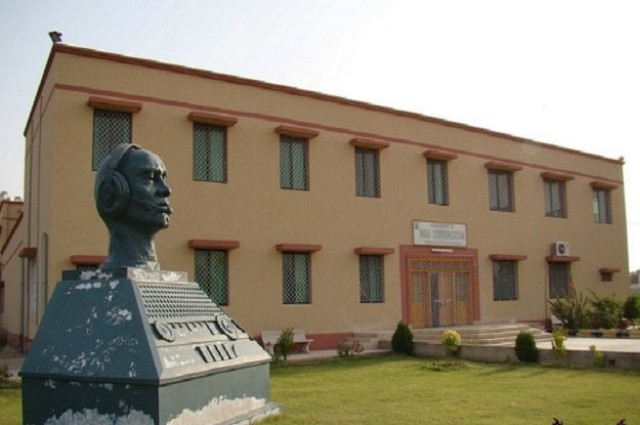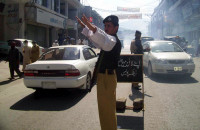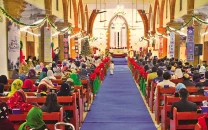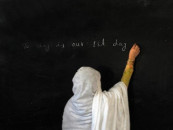Motivation for SU student’s suicide yet to be unearthed
Judicial inquiry suggests blackmail, exploitation as main causes

PHOTO COURTESY: USINDH.EDU.PK
"Thus, in light of whatever is stated [by 35 persons who recorded their statements] it becomes evident at this stage that on January 1, 2017, [deceased] Naila Rind was available in her hostel room which stood locked from inside [and] where her body was found in the state of hanging from the ceiling fan with no possibility of anybody else to enter into [the room]," reads the 24-page report of Hyderabad District and Sessions Judge Amjad Ali Bohio, whom the SHC had assigned inquiry of the incident.
The investigation answers one of the two questions that it was set to investigate - in what circumstances was Naila’s body found. The second question - the reason for her death - remains without a definite answer.
The incident
Naila died on January 1 evening. Mahjabeen Khatti, warden of Sindh University’s (SU) undergraduate hostel, was the first to see the body hanging from the ceiling fan. The matter was later conveyed to SU's authorities through Dr Aneela Naz Soomro, the former provost of the girls' hostel.
Special team to probe DIG’s killing in suicide attack
Khatti was on a round in Block A of the undergraduate hostel when she knocked on Rind’s room door and found it locked. "Then I peeped with raised heels from the window which has a grill and glass and saw her body.”
Naila and four other female students were allotted the same room, 36-A. But that night she was alone because her roommates had returned to their homes for winter vacation. The girls, Rabia Ayoub and Saba Hussain, told the judge that they left the hostel by mid to December 20, 2016. The two other roommates, Farhat Jabeen Arain and Kiran, did not appear before the inquiry.
Former Jamshoro police station SHO Tahir Hussain Mughal told the judge that when he reached room he saw the body hanging with her tongue sticking out of her mouth. He added that he inspected the room and found no entrance except the door that was locked from inside.
Four watchmen and a security guard claimed in their statements that no one entered or left the hostel around the time of the incident. The judge himself visited the hostel room, after he initiated the inquiry on the SHC's September 26 order, and found no other entrance except the door. "There were two windows with iron grills which were found intact," the judge stated in the report.
Sindh University professor challenges action against him without inquiry
Reason for alleged suicide
"All the evidence and the statements of different persons brought on record in the case file of the investigation officer opined that compelling reason of death of Naila Rind is deception and blackmailing by accused Anees Khaskheli," the report observed.
According to Mughal, the digital as well as oral evidence pointed to blackmail and exploitation by Khaskheli "who was more than an acquaintance of Rind". The police came to know about Khaskheli when they were in the hostel room and Naila's mobile phone rang with Khaskheli on the other end. Mughal said that when he said 'hello' after attending the call, the caller disconnected.
The police later obtained the call data record and arrested Khaskheli. "He confessed to an affair with Naila and his subsequent deception," the SHO and former Jamshoro SSP Captain (retd) Tariq Wilayat stated.
Naila's father Nizamuddin Rind, brothers Nisar and Sohail and uncle Khadim Hussain Rind informed the judge that on December 28, three days before her death, the deceased appeared disturbed at her house in Kamber-Shahdadkot district. She later told the family that she was being harassed by someone with the mobile number 03463834156.
Khaskheli told the police that he was first introduced to Naila in a Whatsapp group of students of SU and that two or three months before the incident the two started chatting privately on Whatsapp. After around 15 days of chatting they met at SU's central library for the first time. The chatting continued and the two started to share their photographs.
Number of universities have increased at cost of quality, says SMIU VC
According to the police, the two also shared nude photos with each other. "We exchanged these photographs but it wasn't the reason of her death," Khaskheli maintained.
The judge also investigated how a photo showing the body hanging from the fan was leaked. Upon his inquiry, Mughal claimed that besides him a Special Branch's ASI, later identified as Ali Hyder, took the snaps. However, in his statement before the judge, Hyder denied the charge and accused Mughal of being biased towards him because he had exposed a gang of narcotics dealers in his jurisdiction in Jamshoro.
The judged ordered the Sindh inspector-general to conduct an inquiry and take action against the official responsible. "The act of making the photo viral on social media has hurt feelings of the family."
Khaskheli is undergoing trial in an Anti-Terrorism Court. The FIR contains sections 315, 316 and 509 of the Pakistan Penal Code (PPC), 6/7 of the Anti-Terrorism Act (ATA) and 9 and 13 of the Prevention of Electronic Crimes Act.

















COMMENTS
Comments are moderated and generally will be posted if they are on-topic and not abusive.
For more information, please see our Comments FAQ